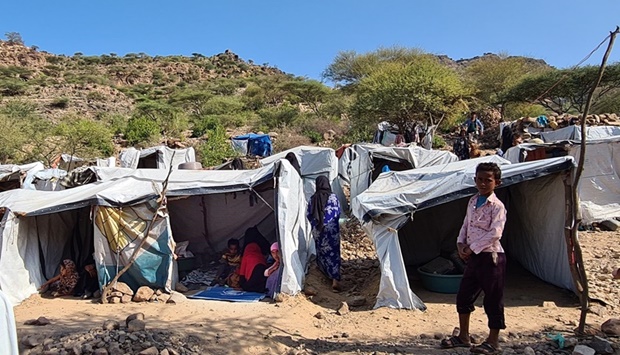Qatar Red Crescent Society (QRCS) has launched an integrated intervention project in the sectors of health care, food, shelter, water, sewage, and hygiene, to meet the needs of the displaced and most vulnerable communities in the districts of Jabal Habashi and Maqbanah, Taiz Governorate, Yemen.
At a total cost of nearly $2 million, the new project is funded by the United Nations Office for the Coordination of Humanitarian Affairs’ (OCHA) Yemen Humanitarian Fund (YHF).
The project was launched during a workshop held by QRCS in Taiz, with the aim of introducing stakeholders to the project’s details and components, which include the following: (1) construction of 350 makeshift shelters, (2) provision of nonfood items (NFIs) for 887 displaced families, (3) construction of 195 toilets with fittings, (4) digging of two water wells with hand pumps, (5) rehabilitation of two water projects near camps in Maqbanah, (6) rehabilitation and operation of 12 health facilities, and (7) equipment and deployment of mobile medical clinics.
Nabil Jaamil, Director of the Office of Planning and International Cooperation in Taiz, said QRCS projects would fill in the gap, meet the needs, and reduce pressure on the local authority in Taiz. According to him, the new operation will be executed in Jabal Habashi and Maqbanah because they are among the areas desperate for assistance due to security instability.
Rajeh Al-Maleeki, Director of the Health Bureau of Taiz, considered QRCS a “key partner in sustainable health projects with long-lasting results. “This workshop is the last of a series of meetings with QRCS to agree on all the details related to the backing and rehabilitation of health facilities,” he said.
Eng. Tarik Taher Al-Mikhlafi, Director-General of the Water Corporation in Taiz, said, “Taiz saw massive destruction of infrastructure, which resulted in halt, damage, and obsolescence of most water projects. Amid increasing fuel prices, this vital sector has come to a standstill, and it is increasingly difficult for people to find clean drinking water”.
“This project will meet the water needs of people, by replacing the hand pumps with solar-powered ones in specific locations of Maqbanah. I wish that donors focus on water supply, which is a source of much suffering for many people,” he added.
Adnan Munser, the project’s manager, said, “Based on the districts selected by the donor, QRCS surveyed the most vulnerable and underserved areas. We assessed and identified the status of health facilities near to the camps of internally displaced people (IDPs), and we came up with a whole list of needs. Accordingly, support was apportioned as follows: health care 31%, food 13%, shelter and NFIs 36%, and water and environmental sanitation 20%. The 12-month project will reach out to 36,574 beneficiaries, including 2,559 persons with special needs”.

